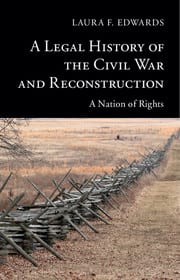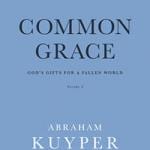I don’t remember the exact conversation, but at some point last Spring I realized that I don’t actually know much about the ‘right’ way to interpret the Civil War Amendments. These are the 13th, 14th, and 15th Amendments to the US Constitution, passed as a direct result of the war between the states. As is probably clear to any regular reader of this blog, I am an orignialist in my approach to the Constitution, which means that I think we ought to read and apply the document the way a reasonable reader would have read and applied it when it was written.
The problem is, the Civil War Amendments weren’t written in the 1780s (about which I know a bit), they were written between the mid-1860s and 1870, about which I don’t know much at all. Just what is an “originalist” reading of these Amendments? What would the average reader in the 1880s, for example, have understood the 14th Amendment to mean? To help out with this, I picked up Laura Edwards’s book A Legal History of the Civil War and Reconstruction: A Nation of Rights.

I did not find what I wanted in this book. Which is not to say the book isn’t worthwhile! In fact, it’s an interesting book and one that I’d cheerfully encourage you to go out and read. There is much here that’s worthy of reflection–for example, this was the era when local government autonomy took a major hit. For all it’s rhetoric of localism, the Confederate government didn’t really tolerate local governments going their own way and took steps to strip them of their power and independence.
What’s more, this book does an excellent job of stressing the legal back-and-forth between the competing factions of the time, both during the war itself and during the Reconstruction period. Edwards highlights tensions in society and in the law that were not resolved by the war or by the subsequent Amendments (and are still with us today).
With all that said, this book is much more about what the Civil War Amendments didn’t do than about what they did do, or how they were interpreted at the time. I suspect some of that is the result of methodology, with perhaps too much reading of our own contemporary sensibilities into the past. For example, Edwards argues that “those who sheltered deserters and who participated in food riots are examples of a wider effort to reclaim the social order.” (62) It is certainly possible that such individuals were making complicated political statements. But I suspect that’s a 21st century interpretation being pushed back on the war-ravaged South. It would seem much more likely that those who sheltered deserters were protecting their family, and those who participated in food riots were hungry.
Again, let me encourage you to read this book because it is worthwhile. This is something that Christians especially ought to be thinking about, given our current moment of racial tensions. I am not of course saying that you must share my originalism in order to be a Christian. I am saying that as Christians we all ought to think carefully about the past and its impact on how we behave today. A Legal History of the Civil War and Reconstruction can help us have informed opinions about how we interact with each other politically and culturally in the modern world.
Dr. Coyle Neal is co-host of the City of Man Podcast and an Associate Professor of Political Science at Southwest Baptist University in Bolivar, MO












